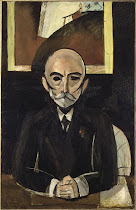A white dog with brown spots. Medium size with a red collar and shiny tag. Floppy ears. Nervous, non-threatening (though it growled at us on one approach). So what do you do when you see an animal in danger? Ever since I placidly watched a turtle get crushed by an SUV (complete with driver on cell phone) I decided I would always do my best to intervene.
Now it's hiding in the bushes of someone's front lawn and we're trying to befriend it using leftover yam rolls from Buddhas Vegetarian. We have better luck with pepperoni sticks from the corner store. The dog bolts again; this time into a backyard. It has cornered itself. There's no one at the house so we ask the people next door to Google what to do about a loose dog in Toronto. They give me the number for the Humane Society. It's 8:30pm on Saturday, they're closed but they have an emergency number for Animal Services. I call them. Unless the animal is injured or injuring us there's nothing they can do (*note: running recklessly across roads does not constitute a "public nuisance"). We call the police and press zero for other inquiries and police advice. There's nothing that can be done for a loose dog in this city.
Looks like we're in this for the long haul. With the help of more pepperoni sticks the dog becomes more comfortable. I propose its name is Millie but it doesn't agree. Calling out 'Darth Vader' gets a longer gaze. The neighbours on the other side appear. A husband and wife who jumped right out of Eastern Ontario, where people are better. They have a leash, a bowl of water, and dogfood. Slowly the dog is beginning to trust me. It eats pepperoni out of my hand but it won't let me touch it. That's okay, it has calmed down a lot, it's only a matter of t-
Then it bolts.
My partner in Dog Whispering slams the gate and the dog crashes into it. Now it's surrounded and panicking. My friend opens the gate -thinking he had shut it on the dog. It escapes. Now it's running north on Manning and trying to cross Harbord again. We follow. This time on Harbord Street the dog is not so lucky -the car connects and sends it down the road. The car drives away. Miraculously, the dog gets up and runs away. Sprints. At top speed. We're running after it still carrying the bowl with dogfood. I expect it to drop and die. It stops on a school lawn and I approach. It looks like the end of the-
It runs again, heading east, and then north, and then east. We are well behind. Last witness we saw it running east on Herrick close to Bathurst. We did a thorough search of the area and went home. Now that we know it's injured we don't know where Animal Services could find it. I suspect it's hidden on someone's lawn. In the bushes, healing or dying. Either way that dog is a long way from home.
We return the dogfood bowl. The husband tells us we're good people. We know that. We spent two hours trying to befriend a lost dog. We're the best of people. "You did your best" is for house league, there's less at stake. Good intentions a happy ending does not make. Part of me wished I had attacked the dog, grabbed it by the neck and tied it to a post.
 This person's picture of a "Britney Spaniel" reminds me of the dog. It's not quite a match. The dog we saw had floppier ears, more brown spots, a red collar, and looked more terrified of everything.
This person's picture of a "Britney Spaniel" reminds me of the dog. It's not quite a match. The dog we saw had floppier ears, more brown spots, a red collar, and looked more terrified of everything.



















